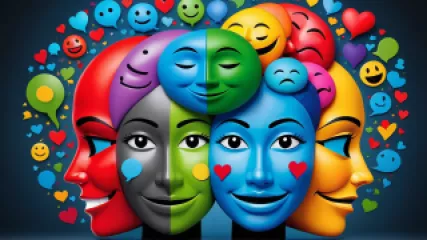Understanding Emotional Intelligence: Research Summary
Emotional intelligence (EI) is a term that has gained significant attention in recent years. As our understanding of the importance of emotional well-being continues to grow, so does the recognition of the role that emotional intelligence plays in our lives. This article aims to provide a research summary of the basics of emotional intelligence, exploring its definition, components, and practical applications.
What is Emotional Intelligence?
Emotional intelligence refers to the ability to recognize, understand, and manage our own emotions, as well as the emotions of others. It involves being aware of our feelings, having empathy for others, and effectively navigating social interactions.
Researchers have identified several key components of emotional intelligence:
- Self-awareness: The ability to accurately recognize and understand one's own emotions, strengths, and weaknesses.
- Self-regulation: The capacity to manage and control one's emotional responses, particularly in challenging or stressful situations.
- Motivation: The drive to set and achieve personal goals, as well as the ability to persevere in the face of obstacles.
- Empathy: The skill of recognizing and understanding the emotions and perspectives of others, and responding appropriately.
- Social skills: The aptitude for building and maintaining positive relationships, communicating effectively, and resolving conflicts.
The Importance of Emotional Intelligence
Developing emotional awareness and managing emotional responses are crucial for personal growth and well-being. Research has shown that individuals with higher levels of emotional intelligence are more likely to experience various benefits in different areas of life.
Interpersonal Relationships
Emotional intelligence plays a vital role in fostering healthy and fulfilling interpersonal relationships. People with higher emotional intelligence are better equipped to understand and respond to the needs and emotions of their partners, friends, and family members. This ability to connect on an emotional level enhances communication, empathy, and conflict resolution.
Leadership and Work Performance
In professional settings, emotional intelligence is highly valued, particularly in leadership roles. Leaders with high emotional intelligence can effectively manage their own emotions and inspire and motivate their teams. They have a better understanding of the dynamics within their organization and can navigate challenging situations with empathy and tact. Research has shown that those with higher emotional intelligence tend to exhibit higher job performance and are more likely to be successful leaders.
Mental Health and Well-being
Emotional intelligence is closely linked to mental health and well-being. Individuals with higher emotional intelligence tend to have better coping mechanisms for stress and are less likely to experience anxiety, depression, or other mental health issues. They are better equipped to manage their own emotions and seek support when needed.
Assessing Emotional Intelligence
Various tools and assessments have been developed to measure emotional intelligence. These assessments typically focus on evaluating the different components of emotional intelligence, such as self-awareness, self-regulation, empathy, and social skills.
One commonly used assessment is the Emotional Intelligence Appraisal (EIA) developed by Travis Bradberry and Jean Greaves. This assessment provides individuals with a score that reflects their emotional intelligence level across different domains. It can be a useful starting point for individuals looking to enhance their emotional intelligence.
Developing Emotional Intelligence
Emotional intelligence is not a fixed trait but rather a skill that can be developed and improved over time. Here are some practical techniques and strategies to enhance emotional intelligence:
- Practice self-reflection: Take time to reflect on your own emotions, triggers, and patterns of behavior. This self-awareness can help you better understand yourself and make conscious choices about how you want to respond.
- Cultivate empathy: Make an effort to see situations from the perspective of others. Practice active listening and try to genuinely understand their emotions and experiences.
- Manage stress: Develop healthy coping mechanisms for managing stress and regulating your emotions. This may include exercise, mindfulness, or seeking support from others.
- Seek feedback: Ask for feedback from trusted individuals to gain insight into how your emotions and behaviors impact others. Use this feedback constructively to make positive changes.
- Continuously learn and grow: Engage in activities that promote personal growth and development, such as reading books on emotional intelligence, attending workshops, or working with a coach or therapist.
Conclusion
Emotional intelligence is a critical skill set that influences various aspects of our lives, including our relationships, work performance, and overall well-being. By developing emotional awareness and practicing emotional self-care techniques, we can enhance our emotional intelligence and experience greater personal growth and fulfillment. Assessments such as the Emotional Intelligence Appraisal can provide insights into our current emotional intelligence level, acting as a starting point for our journey towards self-improvement. Remember, emotional intelligence is not fixed, and with time and effort, we can continue to develop and refine these essential skills.






